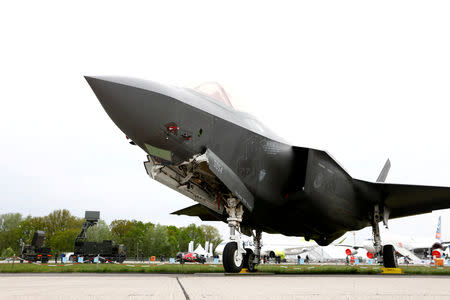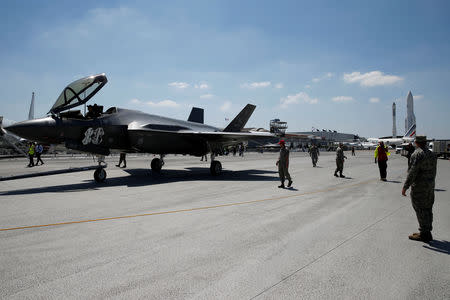Despite Ankara's claims, U.S. can make F-35 without Turkish parts: sources
By Mike Stone and Humeyra Pamuk WASHINGTON (Reuters) - The United States can still proceed with the trillion-dollar F-35 fighter jet program without Turkish components, U.S. sources said, rebuffing arguments by Ankara that excluding the NATO ally would be too complicated. Washington is exploring whether it can remove Turkey from production of the stealth fighter jet, angered by Ankara's refusal to back down from its planned purchase of a Russian-made defense missile system. Reuters last week reported that the United States could soon freeze preparations for delivering F-35 fighter jets to Turkey. While no decision has been made, excluding Turkey from the F-35 program, in which it has been a long-time partner, would be a massive blow to already strained ties between Washington and Ankara. Turkish President Tayyip Erdogan has repeatedly said Ankara remained committed to buy a Russian air defense system that the United States says would compromise the security of F-35 aircraft, which is built by Lockheed Martin Corp. The United States and other NATO allies who own F-35 fighter jets fear the radar on the Russian S-400 missile system will learn how to spot and track the F-35, making it less able to evade Russian weapons in the future. The United States has offered Turkey the more expensive Patriot anti-missile system at a discount that expires at the end of March, but on condition that Ankara drop its plans to buy the S-400. So far Ankara has not shown any willingness to reverse the S-400 purchase, forcing the United States to explore a future for the F-35 program without Turkey, which makes parts of the fuselage, landing gear and cockpit displays. Two U.S. sources familiar with the F-35's intricate worldwide production process and U.S. thinking on the issue say Turkey can be replaced. Officials with the Pentagon and the Turkish embassy declined to comment. "There are about 800 parts that Turkey makes for the F-35, and of them, very few are sole source," said a person with direct knowledge of the U.S. position, explaining that single source parts from Turkey can be replaced by contractors who had previously bid to make them. "Turkey is not too big to fail," the person said. Ankara has long said it plays a key role in the F-35 program and that excluding it would not be easy. Turkish Foreign Minister Mevlut Cavusoglu said in December that the U.S. cannot unilaterally cancel Turkey's participation. NO MAJOR DELAYS IF TURKEY DROPPED But several U.S. sources said the impact would not be drastic. Replacing or finding substitutes for the Turkish components would slow production for a three-month period at the Lockheed Martin facility that builds the jets, one of the sources said. Several components of the F-35 made in Turkey can be easily replaced. For example, the center fuselage produced in Ankara could be made by Northrop Grumman Corp , which already makes them in California. Lockheed declined to comment. Arda Mevlutoglu, a Turkey-based defense industry consultant, said removal of Turkey from the program would not cause major issues for F-35 production process. "Removal of Turkey from the supply chain will definitely create some delays in the production and delivery process ... I personally believe that it will not create drastic delays and cost overruns," he said. In the mean time, more Turkish pilots are set to begin training at U.S. air force bases, joining pilots already there, while Ankara still hopes to take delivery of two aircraft in November. Turkey has said it plans to buy a total of 100 aircraft over the years. Acting U.S. Defense Secretary Patrick Shanahan said on Tuesday he wants Turkey to remain in the F-35 fighter jet program, but added that Ankara needed to buy the Patriot missile defense system. (Reporting by Mike Stone and Humeyra Pamuk; Editing by Lisa Shumaker and Phil Berlowitz)

